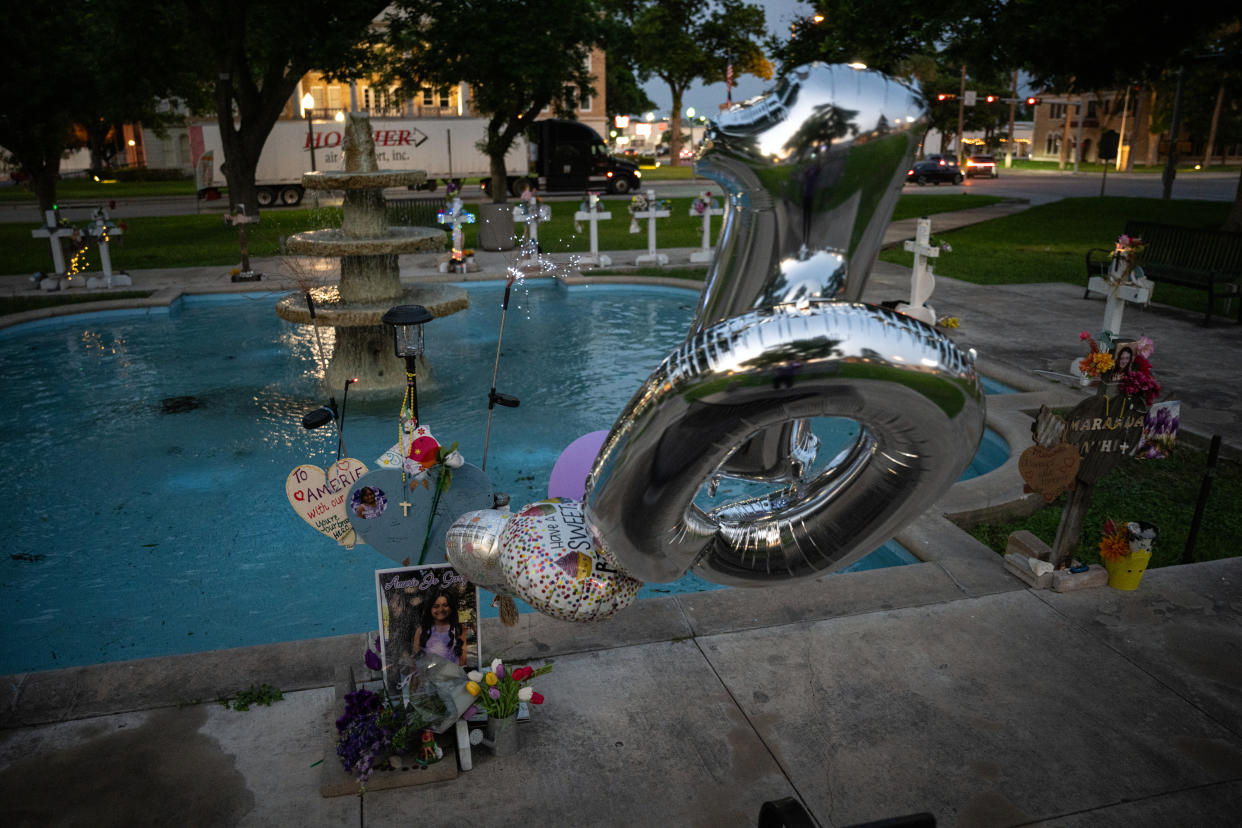Uvalde Settles With Victims’ Families Over School Shooting

UVALDE, Texas — The city of Uvalde, Texas, has reached a settlement with most of the families of children who were shot by a gunman at Robb Elementary School in 2022, lawyers for the families said Wednesday. To avert a lawsuit, the city promised to overhaul the city’s police force, create a permanent memorial to the victims and pay $2 million, the lawyers said.
The settlement, announced at a news conference in Uvalde, involved the largest group of potential plaintiffs: 17 families of children who were killed during the May 24 massacre, and two families of children who were wounded.
In addition, the lawyers said they had filed a new lawsuit against the Texas Department of Public Safety over the failure of its officers to rapidly engage the shooter, who killed a total of 19 children and two teachers inside a pair of connected classrooms. That lawsuit also names as defendants Pete Arredondo, who was chief of the Uvalde public school police department when the shooting occurred, and Mandy Gutierrez, who was principal of the school at the time.
Sign up for The Morning newsletter from the New York Times
State police officers, along with scores of officers from local agencies and federal agents, were outside the classrooms for 77 minutes before a team, led by federal Border Patrol agents, breached a door and killed the shooter.
“These officers were so terrified that they chose to abandon their burden to the Uvalde community: Put themselves between a very dangerous person and a child,” Josh Koskoff, a lawyer for the families, said in a statement.
In its settlement, the city agreed to do a better job hiring qualified officers and providing appropriate training, including on the handling of active shooters.
In discussing how the settlement came about, Koskoff said city officials made it clear they could not afford to pay a large damage award. “You can have all the insurance money,” he said he was told. He said the parties agreed to focus instead on what he called “restorative justice” measures by the city.
City officials said in a statement that they were “thankful” to reach an agreement that would help the city both remember and move past “our community’s greatest tragedy.”
“We will forever be grateful to the victims’ families for working with us over the past year to cultivate an environment of communitywide healing that honors the lives and memories of those we tragically lost,” the statement said.
Inquiries by state officials and by the U.S. Justice Department faulted the officers who were at the school for treating the shooter as a barricaded subject — requiring a less immediate response — rather than as an active shooter who they needed to confront rapidly in order to save lives.
The lawyers, who are representing the families pro bono, argue in their lawsuit that the delayed response by law enforcement officers increased the likelihood that wounded students or teachers would die from their injuries.
“While overdue, this settlement reflects a good-faith effort, particularly by the City of Uvalde, to begin rebuilding trust in the systems that failed to protect us,” Veronica Luevanos, whose daughter Jailah and nephew Jayce died in the massacre, said in a statement.
This year, the local district attorney, Christina Mitchell, began presenting evidence to a grand jury to consider criminal charges against officers for their parts in the police response. Mitchell did not respond to a request for comment about when that process would be completed.
Koskoff described the police response as an “inexcusable failure.”
“These were the last line of defense — they failed,” he said, noting that city, county, state and federal agents and officers all arrived at the scene but failed to move in on the shooter in a timely way.
In the settlement, the city promised to better commemorate the massacre, which tore at the fabric of Uvalde, a mostly Hispanic and conservative community in the ranch land west of San Antonio.
Uvalde has been in turmoil in the two years since the shooting. On Wednesday, the school district said its new police chief, who replaced Arredondo, had submitted his resignation. A district spokesperson did not provide a reason for his departure.
The lawyers for the victims’ families said in a news release that the families did not want to pursue a prolonged and costly legal action against the city that could have bankrupted the local government. The $2 million payment included in the settlement, to be split among the families, will be covered by the city’s insurance, they said.
In addition to an existing memorial, the city agreed to designate the May 24 anniversary of the shooting as a day of remembrance; to build a community center; to provide mental health services for survivors and the families of victims; and to do a better job of maintaining the cemetery where many of the victims are buried.
Several other suits connected with the shooting remain active against state and local police agencies and against Daniel Defense, the manufacturer of the assault-style rifle that was used by the 18-year-old shooter.
Koskoff said the families were working on a settlement with Uvalde County, and planned to sue the federal government and others.
Javier Cazares, the father of Jacklyn Cazares, who was 9 when she died at the school, took the microphone at the news conference, held at the city’s civic center, to lament that few members of the public had shown up for the settlement announcement to support the families. “This room should be filled, and then some,” he said.
c.2024 The New York Times Company


